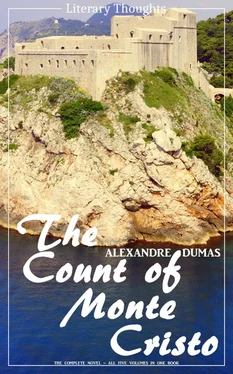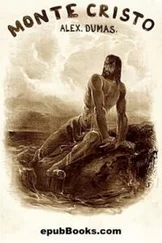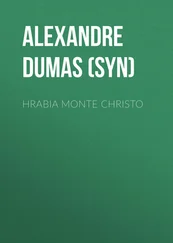"If I were sole owner we'd shake hands on it now, my dear Dantes, and call it settled; but I have a partner, and you know the Italian proverb – Chi ha compagno ha padrone – 'He who has a partner has a master.' But the thing is at least half done, as you have one out of two votes. Rely on me to procure you the other; I will do my best."
"Ah, M. Morrel," exclaimed the young seaman, with tears in his eyes, and grasping the owner's hand, "M. Morrel, I thank you in the name of my father and of Mercedes."
"That's all right, Edmond. There's a providence that watches over the deserving. Go to your father: go and see Mercedes, and afterwards come to me."
"Shall I row you ashore?"
"No, thank you; I shall remain and look over the accounts with Danglars. Have you been satisfied with him this voyage?"
"That is according to the sense you attach to the question, sir. Do you mean is he a good comrade? No, for I think he never liked me since the day when I was silly enough, after a little quarrel we had, to propose to him to stop for ten minutes at the island of Monte Cristo to settle the dispute – a proposition which I was wrong to suggest, and he quite right to refuse. If you mean as responsible agent when you ask me the question, I believe there is nothing to say against him, and that you will be content with the way in which he has performed his duty."
"But tell me, Dantes, if you had command of the Pharaon should you be glad to see Danglars remain?"
"Captain or mate, M. Morrel, I shall always have the greatest respect for those who possess the owners' confidence."
"That's right, that's right, Dantes! I see you are a thoroughly good fellow, and will detain you no longer. Go, for I see how impatient you are."
"Then I have leave?"
"Go, I tell you."
"May I have the use of your skiff?"
"Certainly."
"Then, for the present, M. Morrel, farewell, and a thousand thanks!"
"I hope soon to see you again, my dear Edmond. Good luck to you."
The young sailor jumped into the skiff, and sat down in the stern sheets, with the order that he be put ashore at La Canebiere. The two oarsmen bent to their work, and the little boat glided away as rapidly as possible in the midst of the thousand vessels which choke up the narrow way which leads between the two rows of ships from the mouth of the harbor to the Quai d'Orleans.
The shipowner, smiling, followed him with his eyes until he saw him spring out on the quay and disappear in the midst of the throng, which from five o'clock in the morning until nine o'clock at night, swarms in the famous street of La Canebiere, – a street of which the modern Phocaeans are so proud that they say with all the gravity in the world, and with that accent which gives so much character to what is said, "If Paris had La Canebiere, Paris would be a second Marseilles." On turning round the owner saw Danglars behind him, apparently awaiting orders, but in reality also watching the young sailor, – but there was a great difference in the expression of the two men who thus followed the movements of Edmond Dantes.
Chapter 2 – Father and Son.
We will leave Danglars struggling with the demon of hatred, and endeavoring to insinuate in the ear of the shipowner some evil suspicions against his comrade, and follow Dantes, who, after having traversed La Canebiere, took the Rue de Noailles, and entering a small house, on the left of the Allees de Meillan, rapidly ascended four flights of a dark staircase, holding the baluster with one hand, while with the other he repressed the beatings of his heart, and paused before a half-open door, from which he could see the whole of a small room.
This room was occupied by Dantes' father. The news of the arrival of the Pharaon had not yet reached the old man, who, mounted on a chair, was amusing himself by training with trembling hand the nasturtiums and sprays of clematis that clambered over the trellis at his window. Suddenly, he felt an arm thrown around his body, and a well-known voice behind him exclaimed, "Father – dear father!"
The old man uttered a cry, and turned round; then, seeing his son, he fell into his arms, pale and trembling.
"What ails you, my dearest father? Are you ill?" inquired the young man, much alarmed.
"No, no, my dear Edmond – my boy – my son! – no; but I did not expect you; and joy, the surprise of seeing you so suddenly – Ah, I feel as if I were going to die."
"Come, come, cheer up, my dear father! 'Tis I – really I! They say joy never hurts, and so I came to you without any warning. Come now, do smile, instead of looking at me so solemnly. Here I am back again, and we are going to be happy."
"Yes, yes, my boy, so we will – so we will," replied the old man; "but how shall we be happy? Shall you never leave me again? Come, tell me all the good fortune that has befallen you."
"God forgive me," said the young man, "for rejoicing at happiness derived from the misery of others, but, Heaven knows, I did not seek this good fortune; it has happened, and I really cannot pretend to lament it. The good Captain Leclere is dead, father, and it is probable that, with the aid of M. Morrel, I shall have his place. Do you understand, father? Only imagine me a captain at twenty, with a hundred louis pay, and a share in the profits! Is this not more than a poor sailor like me could have hoped for?"
"Yes, my dear boy," replied the old man, "it is very fortunate."
"Well, then, with the first money I touch, I mean you to have a small house, with a garden in which to plant clematis, nasturtiums, and honeysuckle. But what ails you, father? Are you not well?"
"'Tis nothing, nothing; it will soon pass away" – and as he said so the old man's strength failed him, and he fell backwards.
"Come, come," said the young man, "a glass of wine, father, will revive you. Where do you keep your wine?"
"No, no; thanks. You need not look for it; I do not want it," said the old man.
"Yes, yes, father, tell me where it is," and he opened two or three cupboards.
"It is no use," said the old man, "there is no wine."
"What, no wine?" said Dantes, turning pale, and looking alternately at the hollow cheeks of the old man and the empty cupboards. "What, no wine? Have you wanted money, father?"
"I want nothing now that I have you," said the old man.
"Yet," stammered Dantes, wiping the perspiration from his brow, – "yet I gave you two hundred francs when I left, three months ago."
"Yes, yes, Edmond, that is true, but you forgot at that time a little debt to our neighbor, Caderousse. He reminded me of it, telling me if I did not pay for you, he would be paid by M. Morrel; and so, you see, lest he might do you an injury" –
"Well?"
"Why, I paid him."
"But," cried Dantes, "it was a hundred and forty francs I owed Caderousse."
"Yes," stammered the old man.
"And you paid him out of the two hundred francs I left you?"
The old man nodded.
"So that you have lived for three months on sixty francs," muttered Edmond.
"You know how little I require," said the old man.
"Heaven pardon me," cried Edmond, falling on his knees before his father.
"What are you doing?"
"You have wounded me to the heart."
"Never mind it, for I see you once more," said the old man; "and now it's all over – everything is all right again."
"Yes, here I am," said the young man, "with a promising future and a little money. Here, father, here!" he said, "take this – take it, and send for something immediately." And he emptied his pockets on the table, the contents consisting of a dozen gold pieces, five or six five-franc pieces, and some smaller coin. The countenance of old Dantes brightened.
"Whom does this belong to?" he inquired.
"To me, to you, to us! Take it; buy some provisions; be happy, and to-morrow we shall have more."
Читать дальше












